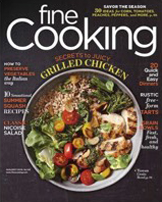
Cloves say “winter holidays” more than any other spice. Think of fragrant baked ham studded with whole cloves. Of the inviting scent of mulled wine simmering on the stove and pomander balls hung on the Christmas tree with red velvet ribbon. Of clove-accented gingerbread, fruitcake, and mincemeat and pumpkin pies.
But cloves aren’t just for the holidays. Year-round, you can find aromatic cloves in pickling spices, in Chinese five-spice powder, and in Indian curries and chutneys. A hint of their fruity, pungent, tingly warm flavor adds an intriguing accent to beef and lamb stews, to chile sauce, and even to ketchup.
Experiment with cloves
• Poke a clove into a whole onion (to make it easier to retrieve later) and add to chicken stock, or add a clove to a bouquet garni for a more complex-flavored stock.
• Add a pinch of ground cloves to a pot of chili for an authentic Mexican flavor that adds a subtle kind of heat.
• Spice up glazed carrots with a tiny pinch of ground cloves.
• Give your favorite coffee cake a slightly spicier style by sprinkling a pinch of ground cloves in the batter.
• Add a whole clove to pear poaching liquid; the spice, with its hint of vanilla, has an affinity to pears as well as to apples, peaches, and plums.
• Store a few cloves in sugar to give the sugar a warm, spicy flavor. Use the sugar over baked apples or with fresh strawberries.
• Enjoy the fragrance of cloves around the house. Add a few cloves to potpourri or make a pomander ball by poking an orange with whole cloves in a pretty pattern.
Plump cloves indicate quality
Cloves are the unopened flower buds of the tropical clove evergreen. The buds are picked by hand just as they turn pink; they’re then dried to a brownish black.
A clove tree is like those of us who live in Cape Cod—it must see the sea and the bay to grow and blossom properly. Most of the world’s cloves come from the Spice Islands of Indonesia, where clove trees flourish on thousands of acres in a tropical, maritime climate. High-quality cloves are also harvested in Brazil, Madagascar, and Tanzania. The best cloves are reddish brown, smooth, and plump, with lighter colored heads and a powerful aroma.
Whole cloves last longer than ground.Ground cloves will quickly lose their essential oil and fragrance; it’s better to buy whole cloves and grind them as needed. Like most spices, cloves should be kept in an airtight container in a cool, dark place. Never store ground cloves in plastic jars; the released oils can dissolve some plastics.
A little bit of cloves goes a long way. The strong flavor of cloves, if used with a heavy hand, can overpower a dish, making it bitter. Most recipes call for just a pinch of ground cloves or only one or two whole cloves. If you’re using good-quality, highly aromatic cloves, use a little less than what the recipe calls for.





















Comments
Leave a Comment
Comments